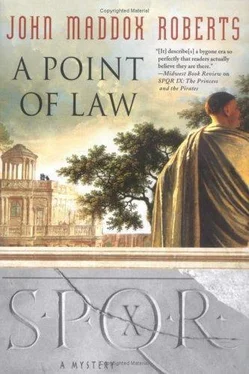John Roberts - A Point of Law
Здесь есть возможность читать онлайн «John Roberts - A Point of Law» весь текст электронной книги совершенно бесплатно (целиком полную версию без сокращений). В некоторых случаях можно слушать аудио, скачать через торрент в формате fb2 и присутствует краткое содержание. Год выпуска: 0101, ISBN: 0101, Издательство: St. Martin, Жанр: Исторический детектив, на английском языке. Описание произведения, (предисловие) а так же отзывы посетителей доступны на портале библиотеки ЛибКат.
- Название:A Point of Law
- Автор:
- Издательство:St. Martin
- Жанр:
- Год:0101
- ISBN:9780312337254
- Рейтинг книги:5 / 5. Голосов: 1
-
Избранное:Добавить в избранное
- Отзывы:
-
Ваша оценка:
- 100
- 1
- 2
- 3
- 4
- 5
A Point of Law: краткое содержание, описание и аннотация
Предлагаем к чтению аннотацию, описание, краткое содержание или предисловие (зависит от того, что написал сам автор книги «A Point of Law»). Если вы не нашли необходимую информацию о книге — напишите в комментариях, мы постараемся отыскать её.
A Point of Law — читать онлайн бесплатно полную книгу (весь текст) целиком
Ниже представлен текст книги, разбитый по страницам. Система сохранения места последней прочитанной страницы, позволяет с удобством читать онлайн бесплатно книгу «A Point of Law», без необходимости каждый раз заново искать на чём Вы остановились. Поставьте закладку, и сможете в любой момент перейти на страницу, на которой закончили чтение.
Интервал:
Закладка:
They were veterans and they looked it. Their arms were dingy, their shield covers weather stained, their helmet crests and plumes drooping, their cloaks every shade of red from scarlet to rust brown. But their boots and swords were immaculate, and if their equipment wasn’t spruced up for parade, it was in perfect battle order. They looked supremely competent and dangerous.
I went out through the Fontinalis Gate with a knot of fellow senators I’d joined in the Forum.
“Jupiter protect us!” said one, as we caught sight of them. “I am glad to know that Caesar is still north of the Rubicon!”
For some reason, we never feared a Roman army as long as its general was somewhere else. Caesar’s imperium ended at the Rubicon. If he crossed it, he would be just another citizen. Or so we thought.
A good-sized fair was taking shape on the Campus Martius that morning, as the itinerant vendors and mountebanks descended upon this cornucopia of soldiery, marched all the way from Gaul with their pay in their purses.
The men themselves were from all over Italy and Sicily, from the tip of Calabria to the northern edge of Umbria. They were the men of the villages and countryside, from towns that had borne Roman citizenship for centuries and others whose fathers had been at war with Rome within living memory. Most of them probably had never laid eyes on Rome.
That was getting to be more and more common of late. In Hannibal’s day, the consuls had been able to whistle up ten legions within a day’s march of the City, so densely was Latium peopled with prosperous peasant families. Now we had to scour the whole peninsula for enough men to fill that many legions, and few real Romans served except as officers. Perhaps Caesar was right, and someday we would have to recruit Gauls. If he didn’t kill them all first, that is.
I searched for familiar faces, but in an army so vast I knew only a relative handful of men. Most of my time in Gaul I had spent in command of auxilia or else working in Caesar’s headquarters. The first soldiers to arrive belonged to legions that hadn’t even been in Gaul when I was last there. The war, originally a fairly modest campaign to support our allies and drive the Germans back beyond the Rhenus, had turned into a vast war of conquest that had spread out to reach the obscure island of Britannia.
Despite their victories, there were no laurels, trophies, or other triumphal insignia in evidence. That would have been too arrogant even for Caesar, and he must have given strict orders for his men to make no such presumptuous display. The Senate still guarded jealously its right to grant or withhold a triumph, and Caesar was not ready to break completely with the Senate. Not yet, anyway.
In fact, as soon as their camp was made, the men made tripods of their spears, leaned their shields against them, put their helmets on the spear points, and stored their armor and swords inside the tents. When they circulated among the crowds, they retained only their military belts and boots as insignia of their status. At this demonstration of goodwill, the most ardent anti-Caesarians breathed a sigh of relief and joined in the general festivity. Thus disarmed, the soldiers were free to enter the City.
The soldiers, like soldiers of all times and places, showed off their awards and souvenirs and loot. Torques-the twisted neck rings worn by all Gallic warriors-were everywhere, from simple bronze pieces worn by the humbler Gauls to magnificent specimens of highly worked gold and silver taken from the necks of chieftains, often by the simple operation of removing the head at the same time. Within days it seemed as if every boy in Rome was wearing a big, bronze ring around his thin neck.
Others displayed beautiful shields of enameled bronze and long, narrow swords that looked exotic to eyes accustomed to the short, broad gladius . Gauls are passionately fond of jewelry, and these men had brought back tons of it, as well as yards of extravagantly dyed cloth worked in bewildering patterns of stripes and checks. Rome soon had the most colorful, glittering whores in the world.
I suppose it must have been the same when the Greeks returned from Troy.
“Very clever,” remarked Scribonius Libo, another candidate for praetor and a friend of Pompey. “It’s just like Caesar to accomplish several things with a single act. First, all these men will weight the polls in favor of his candidates. Second, it will remind everyone of how powerful he has grown. Third, it’s a recruiting campaign: these men are proclaiming, ‘Look how rich a soldier can become by serving with Caesar.’ ”
“Caesar uses his resources efficiently,” I agreed, “but it’s all perfectly legal.”
“It shouldn’t be,” Scribonius grumbled. “We need a law that keeps the legions on the frontiers as long as they’re under arms.”
There was a lot of such talk in those years. Our old system of raising legions for each new war and then disbanding them upon their return was terribly outdated. We still raised them that way for a really large-scale war like Caesar’s, or for an impromptu campaign like that of Crassus against Parthia, but settling the veterans of victorious wars proved to be a perpetual headache. Usually they had no land to return to, much of Italy having been bought up by plantation owners. These, having got the land cheap, were reluctant to see any of it parceled out to veterans. Many of the greatest of these landlords were senators. This was one more way in which my own class was busily cutting its own throat during those years.
The legionaries rarely had any trade save farming or fighting. Since land was scarce, they did their best to stay under arms as long as possible. Some legions had become permanent institutions, passed on from one proconsul to the next, remaining under their standards for twenty years or more. Others, disbanded, stayed together with their arms handy, waiting for the next call to the eagles.
Somehow, we had acquired a class of professional soldiers. They were a constant danger to the stability of the Republic, and Scribonius was not alone in calling for their virtual banishment from Italy, locating them instead in permanent forts along our frontiers. It was an argument with merit, but thus far nobody had the courage or the power to implement such a plan. Pompey could have done it, but his power was heavily invested in the old system. His demobilized veterans were his clients and his power base. He could call them back to arms at any time, and everybody knew it.
What nobody mentioned was the greatest source of wealth for Caesar’s rampaging legions: slaves. After the larger battles, in which great numbers of prisoners were taken, Caesar sometimes gave each man a prisoner as a slave, to sell or keep as he saw fit. Of course, men constantly under arms and on the march had little use for slaves and no convenient way to send them home, so they usually sold them immediately to the slave traders who followed the legions like vultures hovering over a battlefield.
These prisoners, I must add, were not captive warriors. Those were regarded as too dangerous for field or domestic service, so they were usually killed on the spot, if they had not killed themselves already to avoid disgrace. Those survivors Caesar selected to fight in his triumphal games were sent to Italy in chains under heavy guard. One need not waste much pity on them. Some of them actually survived the combats and won their freedom. In any case, Gallic warriors had no objection to death in combat. It was work they feared. To men of their class, common labor was unutterably dishonorable and degrading.
The captives were mostly the women and children of the tribe, or people who were already slaves, and these last were the most numerous. Unlike the Germans, among whom all freeborn men were warriors, the Gallic warriors were aristocrats. The bulk of the population were Gauls born to slavery or to a sort of degraded serfdom that was little better.
Читать дальшеИнтервал:
Закладка:
Похожие книги на «A Point of Law»
Представляем Вашему вниманию похожие книги на «A Point of Law» списком для выбора. Мы отобрали схожую по названию и смыслу литературу в надежде предоставить читателям больше вариантов отыскать новые, интересные, ещё непрочитанные произведения.
Обсуждение, отзывы о книге «A Point of Law» и просто собственные мнения читателей. Оставьте ваши комментарии, напишите, что Вы думаете о произведении, его смысле или главных героях. Укажите что конкретно понравилось, а что нет, и почему Вы так считаете.









